Trials and Tribulations Reveal God’s Blessing
“Lord, if you allowed this to happen, it’s because you will give me something better.” These were the words that Rosalva expressed when she saw her home torn apart by an earthquake that hit the town of San Lorenzo, in the department of Ahuachapan, about 100 km west of the capital city San Salvador, in El Salvador.
Earlier that day, at about 1 in the morning, the town had felt a tremor. Then, at 11 a.m. of the same day, a 4.6 earthquake hit the area; this is like detonating 1,000 tons of TNT.
Rosalva worked as a baby sitter on the other side of the town, and as soon as she could, she ran home, only to see a big hole in the roof, since most of the tiles had fallen off because of the magnitude of the quake. The walls, made of adobe (a mix of clay and straw), had cracks all over, and the danger of them falling apart was evident.
Thanks to God, her family was okay, but the damages to the house were irreversible. “All four corners of my house were completely separated” says Rosalva, trying to describe how her home, a small, one-room house, had cracks so big that the corners were not together anymore. (more…)
Sewing Mamas Work for a Better Future
For three months the women met, sitting at their sewing machines, not only learning a skill to help them support their families, but also gaining new hope and faith in God.
This exceptional group of women at Centro de Desarrollo Gracia y Poder student center in Honduras benefited through a workshop carried out through our Complementary Interventions programs.
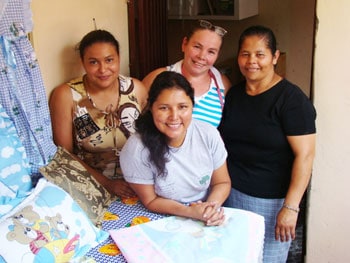
The seed fund was for $3,000 to teach these women, who didn’t know anything about sewing, a skill that could help them generate an income. The training lasted three months, and the participants learned how to create bed comforters and bed sets, curtains and tablecloths.
This activity was a life-changing experience for Gladis A., who didn’t just learn a new skill, but also opened her heart to Jesus through this workshop. (more…)
Holes in the Pockets
Aleja wakes up very early in the morning, as she does every Saturday, to go to the market and buy the groceries for the week. She takes with her the same amount of money she usually does, but to her surprise she can’t even buy half of the things she needs.
At home, Aleja has five small children waiting for her to bring them something to eat. She is a single parent, mother of two sponsored children from Betel Student Center in the city of Oruro. She was abandoned by her husband and left with her children.
The family lives in a very small and dark room where they have three beds, a small table, some chairs and a small, wrecked shelf. Outside of the room, they use a small space covered with old pieces of calamines as their kitchen.
Aleja works washing clothes. She earns around $21 per week, and that is how she supports her family. She uses the money to pay the rent, the water, the electricity, the gas and buy the food and some things her children need for school. (more…)
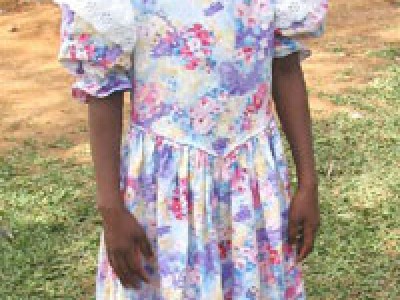
Highly Vulnerable Children: What Special Needs Do They Have?
Highly vulnerable children in our programs are children at greatest risk of physical, psychological or social harm relative to other children in our child sponsorship program.
A Chance to Survive
Hello Compassion Blog readers.
Sorry I haven’t contributed much lately. I’m still here and still handling crisis communications, in case you were wondering. There is something that has been on my mind that I feel compelled to share with you.
I’m gonna step outside my comfort zone for a minute to share this with you. I have Rheumatoid Arthritis. I was diagnosed with it when I was 15, so I’ve had it for half my life, but you’d probably never know it if you met me. I don’t talk about it much. Most people I interact with on a regular basis don’t even know. In the past 10 years, the medical research and pharmaceutical industries have come a long way in treating the disease, and this has allowed me to live to a virtually pain-free, symptom-free life.
But here’s the thing. I have a normal life simply because I happen to have been born in the United States. I have access to powerful drugs. I have insurance to cover the (outrageously high) cost of them. Certainly I am grateful for this, but lately I’ve been thinking about what my life would be like if I were born into poverty in a developing country. What if I was from rural Rwanda? Or a slum in the Philippines? Or a poor community in Nicaragua?
I’d more than likely be totally crippled by now. At 30 years old.
This thought really freaks me out, to be honest with you. I cannot imagine what it would be like to not be able to stand up straight, to walk, or to grip things. To live in constant, life-altering pain. I feel guilty for being happy I was born here. I don’t have to try to live with this disease without the help of drugs. I am not crippled. I assume it’s similar in a way to the guilt a person feels when they survive a car accident where the other passengers died . . . the ugly injustice of it. I understand that God’s ways are higher than our ways, but I struggle to understand why He chooses for some — why He chose ME — to be born into affluence and why He chooses some to be born into poverty. It’s not fair.
Nowhere is this injustice more evident than in the fight against HIV and AIDS. December 1 was World AIDS Day, and Brianne told you about our AIDS Initiative. The amazing thing about this program is that it literally restores justice to an unjust world. Without access to antiretroviral drugs, those battling AIDS in poverty-stricken countries fight an unwinnable war. By providing the antiretroviral therapy, Compassion allows children with death sentences another chance at life. A chance that, had they been born here, they would have had simply by virtue of their nationality.
If anyone is in the position to get this, it’s Godfrey. He understands that he is alive today because Compassion is fighting the injustice of HIV and AIDS in Uganda. His life is his testimony.
Compassion’s AIDS Initiative is more than just drugs. It’s nutritional support. It’s the critical laboratory testing. It’s psychosocial support. It’s treatment of opportunistic infections. It’s transportation assistance. It’s income generation. It’s housing repair. It’s all the opportunities that a person suffering from HIV here in the U.S. would have.
The AIDS Initiative essentially levels the playing field to give every victim of HIV — no matter where they were born — an equal chance to survive this devastating disease.
Give someone a chance to survive by supporting the AIDS Initiative today.
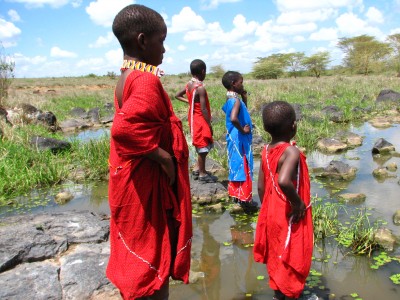
The Stigma of HIV and AIDS
One of the huge challenges facing people living with HIV around the world is not only the physical illness, but the overwhelming stigmatization and discrimination that exists in many countries.
World AIDS Day
Poverty is multi-faceted. It is much more intricate than just a lack of money.
And like many other aspects of poverty, HIV and AIDS have the ability to take a frightening toll on children.
Today is World AIDS Day, and I’m taking it as an opportunity to let you know how committed we are to fighting the disease.
It begins with our AIDS Initiative program, which is working on a grassroots level through the local church to take on the AIDS pandemic, one child at a time.
Ok, pause.
AIDS Initiative, pandemic, poverty . . . I don’t like throwing around these words. It is easy to just roll over the keyboard and punch out the words. But can you imagine? I mean really, can you even imagine what it is like to be infected with HIV or affected by AIDS?
To better understand the effect HIV and AIDS have on people, particularly people in the developing world, and to get a better glimpse into what the Lord is doing through Compassion, I think we need to unpack a few details. I hope your mind is engaged and your heart is prepared because I am about to give you just that.
Now, as I was saying, our AIDS Initiative works to aid one child at a time. For example, this child:
Complementary Interventions With Heidi Partlow
The first thing Heidi Partlow does each morning is check her e-mail. It’s always packed. As Compassion’s complementary interventions manager, she gets all kinds of e-mails each day.
E-mails about how to submit a proposal for a complementary interventions (CIV), e-mails from marketing departments about the particulars of a CIV, e-mails about a disaster that has just occurred.
So her e-mail inbox pretty much dictates her day. After attacking the onslaught of messages each morning, she has a cup of tea at 10 o’clock.
Then she spends a lot of time running around, especially during a week where there has been a crisis, like with the recent hurricanes, getting approvals for funds to be distributed.
But she slowed down enough to give us a peek into CIV and her world. (more…)
A Mosquito Bite Away
One of the things that shocked me when I visited Uganda last month was finding myself scared to death of mosquitoes. It was the strangest feeling to be afraid of something so small — something we usually think of as just a pest. But in Africa mosquito bites don’t just make your arm itch — they kill.
Malaria, which is transmitted by infected mosquitoes, is killing one million people a year. Most of these are children under age 5 in Africa. That’s right. Malaria, which is preventable and treatable, is killing more than 750,000 children a year in Africa.
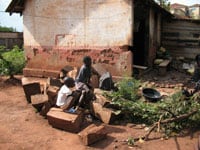 Before visiting Uganda, I never really understood how mosquitoes managed to claim so many lives. But when I visited homes there, I understood. Many of the houses don’t have doors — just sheets covering the openings. And the windows are usually bare, too. So at night, the mosquitoes help themselves.
Before visiting Uganda, I never really understood how mosquitoes managed to claim so many lives. But when I visited homes there, I understood. Many of the houses don’t have doors — just sheets covering the openings. And the windows are usually bare, too. So at night, the mosquitoes help themselves.
Catherine, a single mother I met in Uganda, told me that before Compassion gave her an insecticide-treated mosquito net, she did everything she could to protect her 10-year-old daughter, Irene. But her efforts were in vain.
“Every night, I tried to cover Irene with a blanket, but she would still get bitten all night long,” said Catherine. “I wanted so badly to buy her a net, but I couldn’t afford it.”
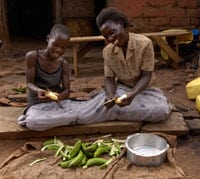 And when Irene got malaria, Catherine certainly couldn’t afford doctors’ bills. “Before Compassion, I would go pleading to doctors for help and beg to pay later,” she said.
And when Irene got malaria, Catherine certainly couldn’t afford doctors’ bills. “Before Compassion, I would go pleading to doctors for help and beg to pay later,” she said.
Thank God that Compassion intervened! Through the ministry’s Complementary Interventions Program, Irene is now getting medicine and sleeps under a quality net. Today, she’s healthy and thriving.
You can make a difference and help protect vulnerable children like Irene! Since today is World Malaria Day, take a minute to learn more about this disease and see how you can join the fight!
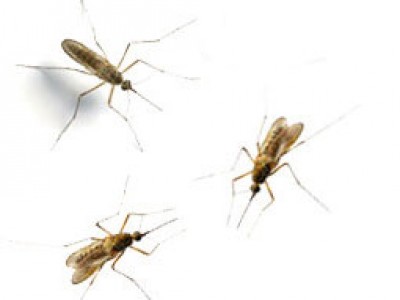
Child Proofing
Child-proofing your home is actually a backwards way of looking at it. You’re not protecting your house from children…you’re protecting children from your house.
Inside Uganda With Jessica Masanganzira
If you’ve been following our 15 Christian bloggers on their trip to Uganda you’ve seen only a glimpse of what it’s like to live in extreme poverty. It’s an outside view of Compassion’s ministry.
Today we begin a series of blog posts from staffers of Compassion Uganda who will give you an inside look into how Compassion’s ministry operates among the poorest of the poor.
What happens if a sponsored child needs an expensive operation? Or if his home is destroyed by a natural disaster? That’s where Compassion’s Complementary Intervention (CIV) program comes in.
CIV seeks to strengthen the ministry’s core programs by providing for needs that go above and beyond child sponsorship. CIV includes a number of ministry areas, including the AIDS Initiative, the Medical Fund, and Disaster Relief.
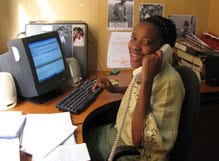 Jessica Masanganzira is the CIV Administrator for Uganda, and she is able to daily provide for the needs of children and church partners in this poverty-stricken country.
Jessica Masanganzira is the CIV Administrator for Uganda, and she is able to daily provide for the needs of children and church partners in this poverty-stricken country.
I have seen many successes in the CIV program in Uganda. The water program, for one, has helped many communities here, and it has contributed a lot towards improving the health of the children and immediate families.
In the Mulatsi Child Development Center, for example, an average of 32 children each month had diarrhea infections and abdominal pains due to the consumption of contaminated water. After installation of the borehole (a kind of well), medical expenses reduced by 23 percent, distances children traveled to fetch water reduced from 5 to 2 kilometers, and their classroom grades improved by 13 percent to date.
Another CIV project that has had great success in Uganda has been the nutrition training we have provided for children and caregivers. As a result of poverty and low levels of education, inadequate feeding, and lack of knowledge on children’s nutritional requirements, there is a high rate of malnutrition among newly registered children.
On average, 28 percent of children are reported malnourished and yet Compassion cannot continually provide nutritional support for all. Some families can barely afford a single meal a day and only get a reasonable meal only on center days at the project. This was hindering health, social and emotional development.The practical nutrition trainings and demonstration projects have led to improved health among children.
In one of the benefiting projects, Kisoro Child Development Center, malnutrition has dropped to 12 from 68 cases in a period of one year. Children and caregivers learned the nutrition requirements for children, trained in modern farming and animal-rearing methods, food preservation and storage to cater for dry seasons; horticulture and fruit growing, too, have been promoted at the projects and in children’s families.
I pray that CIV will continue to eliminate key child development barriers for the families in our programs. As we are educating and helping children and families, I believe we are changing our whole country. CIV works!


